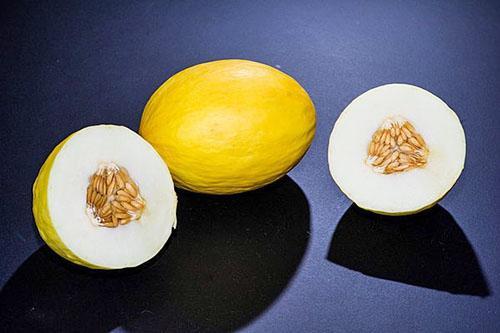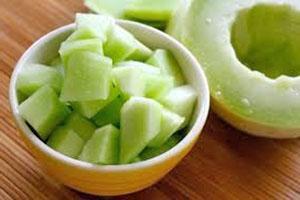Useful properties of melon and contraindications for its use
 Common melon, its beneficial properties and contraindications for use is a real subject for discussion among nutritionists. Kidney benefit or digestion harm? Can I eat with proteins, or is it better to leave it for a separate meal? Why can't many lovers of this fruit boast of a slim figure, despite its low energy value? Melon has a place in almost any diet, no matter what goal you set for yourself when making it. A variety of varieties allows everyone to find their most delicious melons and gourds. Weight problems occur in overeating and depend little on the type of food.
Common melon, its beneficial properties and contraindications for use is a real subject for discussion among nutritionists. Kidney benefit or digestion harm? Can I eat with proteins, or is it better to leave it for a separate meal? Why can't many lovers of this fruit boast of a slim figure, despite its low energy value? Melon has a place in almost any diet, no matter what goal you set for yourself when making it. A variety of varieties allows everyone to find their most delicious melons and gourds. Weight problems occur in overeating and depend little on the type of food.
Briefly about the beneficial properties and contraindications of melon

- Carotenoids and vitamin C. The first is more in the "red" varieties of melon, the second - in yellow, green, honey. Carotenoids and vitamin C help restore visual acuity, accelerate skin regeneration, and allow us to increase muscle density faster after exercise. They are powerful antioxidants. And they work not only for your beauty, but also for the benefit of the immune system, helping to strengthen it.
- Fructose. Often they are afraid to eat it in pursuit of a slim figure, which is a mistake. Fructose provides energy for muscle and brain function and is beneficial in moderate doses.
- Clean and bioavailable water, a catalyst for all metabolic processes in the body.
- Fiber that helps natural bowel cleansing.
 Will a medical nutritionist tell you that melon is bad for you? Yes, in case there is an allergic reaction to melons. Contraindications to the use of melons are also:
Will a medical nutritionist tell you that melon is bad for you? Yes, in case there is an allergic reaction to melons. Contraindications to the use of melons are also:
- Diseases of the kidneys and heart, requiring a restrictive drinking regime.
- Food poisoning and bacterial diseases of the gastrointestinal tract, for the entire period of rehabilitation.
- Dysbacteriosis under treatment.
- Tendency to flatulence and bloating.
- Exacerbation of celiac disease, when a person suffers from diarrhea even without melons.
- Childhood. Melon is not used for the first feeding. It can cause flatulence and indigestion in a baby.
How many calories are in a melon?
 Cantaloupe and honey contain a record 22 kcal per 100 g of fresh pulp. Almost all of them are made from fructose, melon is mainly a carbohydrate product. Since the question is about how many calories in a melon are asked exclusively by those who are losing weight, it is worth knowing that eating fresh melons together with seeds increases the energy load. Dried melon contains about 340 kcal per 100 g, and is literally soaked in ... regular sugar syrup. Modern growers are not very concerned about your waistline, so dry the fruit in a dehydrator yourself. An option may be the purchase of factory packages indicating the composition of the product.
Cantaloupe and honey contain a record 22 kcal per 100 g of fresh pulp. Almost all of them are made from fructose, melon is mainly a carbohydrate product. Since the question is about how many calories in a melon are asked exclusively by those who are losing weight, it is worth knowing that eating fresh melons together with seeds increases the energy load. Dried melon contains about 340 kcal per 100 g, and is literally soaked in ... regular sugar syrup. Modern growers are not very concerned about your waistline, so dry the fruit in a dehydrator yourself. An option may be the purchase of factory packages indicating the composition of the product.
Is melon good for you: an alternative medicine perspective
 Are you asking this question? You are probably familiar with the works of American naturopaths at the beginning of the last century. Is melon good for you? They answered firmly "no". The fruit is too "light" for digestion, and therefore causes fermentation in the digestive tract. After all, all troubles come from him.Paul Bregg argued to his followers that since a piece of cantaloupe would go down their throats, let it happen on an empty stomach, and no other food should go there for three hours. Melon is not a very satisfying product. Many people avoid it for fear of fermentation. Modern scientific nutritional science denies this possibility for a healthy person.
Are you asking this question? You are probably familiar with the works of American naturopaths at the beginning of the last century. Is melon good for you? They answered firmly "no". The fruit is too "light" for digestion, and therefore causes fermentation in the digestive tract. After all, all troubles come from him.Paul Bregg argued to his followers that since a piece of cantaloupe would go down their throats, let it happen on an empty stomach, and no other food should go there for three hours. Melon is not a very satisfying product. Many people avoid it for fear of fermentation. Modern scientific nutritional science denies this possibility for a healthy person.
 In addition, there is also a purely utilitarian view. Melon can be grown using nitrates. No vegetables, fruits and melons can be considered good for our body if they are attacked by modern agricultural production. Nitrates are harmful to the kidneys, liver and heart and can cause real poisoning. If you are on your own garden beds do not use chemicals, enjoy the calmly aromatic sweet piece of melon.
In addition, there is also a purely utilitarian view. Melon can be grown using nitrates. No vegetables, fruits and melons can be considered good for our body if they are attacked by modern agricultural production. Nitrates are harmful to the kidneys, liver and heart and can cause real poisoning. If you are on your own garden beds do not use chemicals, enjoy the calmly aromatic sweet piece of melon.
The influence of the melon itself, its properties and effects on the body are highly dependent on what the product is eaten with. Even if you don’t believe naturopaths and split diet advocates, you should stick to a simple formula. Eat no more than 25 grams of fiber per day to avoid flatulence and bloating, and avoid melons and cruciferous vegetables with legumes in one meal. Mushrooms of different varieties, as well as broths rich in extractives, are not friendly with her either.
Melon benefits for women and for weight loss
 It is believed that the benefits of melon for women are the domain of traditional medicine. An infusion of leaves (2 dry tablespoons per 200 g of boiling water, brew for 20 minutes) is sometimes advised to be taken orally for amenorrhea and cycle disorders. Responsibility for the use of folk recipes lies entirely with the one who is treated with them. Scientific studies have not confirmed the benefits of melon for the cycle.
It is believed that the benefits of melon for women are the domain of traditional medicine. An infusion of leaves (2 dry tablespoons per 200 g of boiling water, brew for 20 minutes) is sometimes advised to be taken orally for amenorrhea and cycle disorders. Responsibility for the use of folk recipes lies entirely with the one who is treated with them. Scientific studies have not confirmed the benefits of melon for the cycle.
Losing weight with melon? It's not about the diet of the same name. Domestic official organizations are silent about the benefits of melon for weight loss, and the possibility of quick weight loss on a mono-diet of this fruit. The American Dietetic Association directly states that no one-food diet, no matter how healthy it cleans the intestines, can be used for weight loss. Limiting the diet to just one tasty melon leads to a critical deficiency of protein and fat in the diet. This can provoke a decrease in immunity and real problems with the thyroid gland. Because of the latter, they write about the dangers of the melon mono-diet. The calories in a kilogram of melon, which are supposed to be eaten for a day, are not enough. Melon diet can provoke overeating. It should not be applied on its own.
 Usually, the harm of melon for weight loss is also described by those who believe that overweight people should not eat foods with a high glycemic index. The statement is not true, at least for those without a family history of diabetes. Melon has a low energy value. It can be a good choice as a snack and treat. Melon is healthier than high-calorie diet candy and meal replacement.
Usually, the harm of melon for weight loss is also described by those who believe that overweight people should not eat foods with a high glycemic index. The statement is not true, at least for those without a family history of diabetes. Melon has a low energy value. It can be a good choice as a snack and treat. Melon is healthier than high-calorie diet candy and meal replacement.